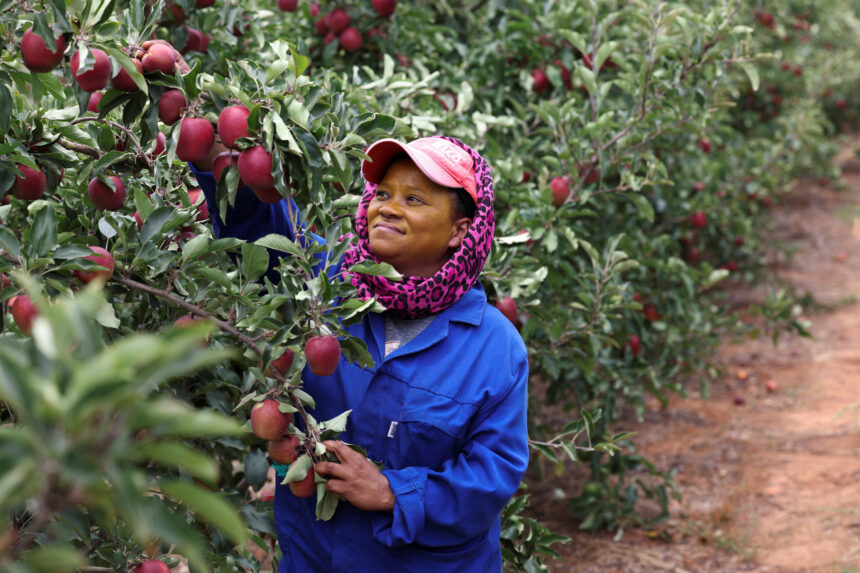Despite ongoing efforts by both government and individual farmers to set up local apple production chains, Namibia remains a net importer after the country imported apples worth over a whopping N$35 million during the final quarter of last year alone.
During the last quarter of 2024, apples were recorded as the second-highest imported horticulture product when Namibia imported more than N$35 million worth from neighbouring South Africa, which supplied 95.7% of the country’s apple needs.
Also, during the same period, potatoes were the number one highest imported product, amounting to N$47.3 million ahead of apples, with tea leaves worth N$14.8 million, vegetable seeds worth over N$14.6 million and bananas valued at N$13.4 million completing the list of the top four highest products that Namibia imported mainly from South Africa.
Although apple production in Namibia is almost non-existent, a market intelligence report by the Namibia Agronomic Board (NAB) shows that over 4,200 apple tree seedlings are being imported into the country on an annual basis, with a further 125 trees produced locally (mostly grown from seeds), therefore indicating a favourable interest in apple production amongst Namibian farmers.
Apple consumption in Namibia is eminent, proven by the fact that it is one of the top imported fruits in the country, particularly given that it is rarely produced locally.
The NAB report further indicates a steady increase in both quantity and value in apple consumption and imports starting from 2018/19, which stood at 8,327 tonnes worth N$70,474,587 to 11,181 tonnes valued at N$105,370,054 recorded during the 2020/21 season, which marked the highest point in both metrics.
After 2020/21, consumption in tonnes and value dropped in 2021/22 to 8,441 tonnes worth N$69,179,739), and while there was a small recovery in 2022/23 of 9,643 tonnes valued at N$73,480,619, it did not reach the previous peak recorded in 2020/21.
“Overall, while Namibia currently relies heavily on imports to meet its apple consumption needs, there is significant potential to develop local production. With the right combination of government policies, farmer initiatives and investor support, Namibia could reduce its dependency on imports, create jobs and boost the local economy through the development of a sustainable apple industry,” the NAB report reads.
Market potential
The NAB positively highlighted that although Namibia does not currently produce apples on a large commercial basis to meet local demand, the country has the potential to develop a local apple industry, given the substantial import of apples worth millions annually.
To get the local apples’ industry up and going, the NAB suggested that Namibia needs to identify regions with climatic conditions that are suitable for apple cultivation (e.g., cooler, higher-altitude areas which can be found in the South Production zones of Namibia), and also implement research programmes to identify and develop apple varieties that can thrive in Namibia’s unique climatic conditions.
These could include drought-resistant varieties or those with shorter growing seasons, while efficient use of water resources, particularly in regions with access to groundwater or rivers, should be prioritised.
The report also recommended that Namibia should develop the necessary infrastructure to support apple farming, such as cold storage facilities and transportation networks, through government investment in infrastructure to reduce post-harvest losses, and ensure that apples reach markets in optimal condition.
Efforts should be made by government in collaboration with the private sector to attract investment in local apple production through the provision of financial incentives such as low-interest loans, subsidies or grants to farmers and investors willing to venture into apple production.
“Other strategies, such as the MSP (Market Share Promotion Scheme) as an import substitution policy or strategy, can be extended to apples to gradually reduce apple imports as local production increases, thus providing a stable market for local farmers and encouraging them to invest in apple production. Local farmers are, therefore, encouraged to be open to learning and adopting new techniques suitable for apple farming, form cooperatives to pool resources, invest in quality seedlings and stay informed about the market trends and consumer preferences to produce apple varieties that are high in demand, both locally and potentially for export,” advised the NAB.
– ohembapu@nepc.com.na


